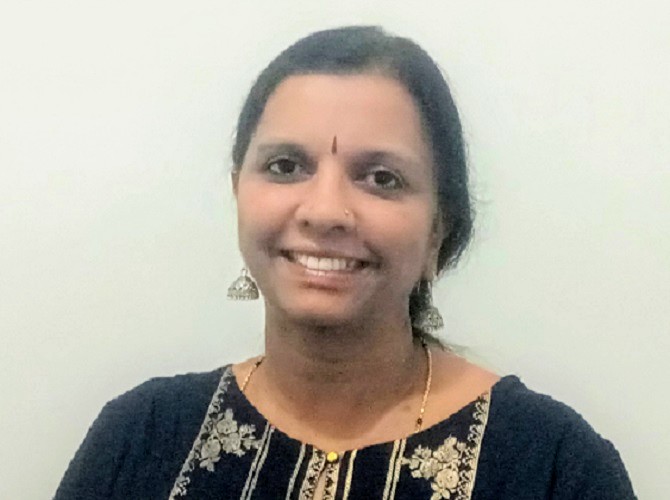
Question 1: Congratulations Geetha on being awarded the best start up in the diagnostics segment in India! We are curious to know how you identified breast cancer as a problem area you would want to tackle and how you conceptualized Niramai?
Thanks. We are very honoured to receive this recognition from Startup India Program. My trigger to work on this problem was an incident in my close family circle. When my 38-year-old cousin sister was detected with late stage Breast Cancer, I was a computer scientist and Lab Director in a Multi-National company. The shocking incident made me turn my research interests towards this disease and when we got some early results from the new idea of using machine learning on thermal images, I decided to quit my job to focus on this problem and founded NIRAMAI startup.
Question 2: Breast cancer is a leading cause of death among women in India and your screening process is being seen as a revolution in the industry, please share how this process works and how it is different from Mammograms, MRIs, and Ultrasounds that have been used to detect breast cancer till date. Moreover, how do you feel Niramai’s solution will help alleviate the issue of lack of timely and cost effective treatment, benefitting the women, especially those in rural areas?
We have developed a novel solution for detecting breast cancer by combining computer intelligence with high resolution thermal sensing. Our solution is non-contact non-invasive, radiation-free, portable and has the ability to detect early stage breast malignancies in an affordable and accessible way. We have developed a AI-software based solution that just measures the temperature variations on the chest and analyzes that data using patented AI algorithms to detect abnormal thermal patterns. Our software generates a breast health report automatically with scores that give probability of cancer or other abnormalities. Unlike Mammography which does not work well on women under 45 years of age, our solution does not depend on age or breast density of the user.
Today, breast cancer mortality rates are almost 50% with approximately 90000 women dying every year from this disease. Many of these deaths can be prevented if the cancer is detected early. With NIRAMAI radiation-free portable solution, we can perform large scale population screening in rural areas, tier-2 and tier-3 cities to identify women who need to be brought for further diagnostic tests in MRI and breast ultrasound. This will enable early detection. NIRAMAI test can be performed in hospitals and diagnostic centres as a part of regular health check-ups.
In general, by enabling a simple privacy aware radiation-free screening test for women of all age groups, the NIRAMAI test can help in improving survival rates and reduce deaths due to breast cancer.
Question 3: What major transformations do you foresee in the biotech sector post-pandemic?
Covid-19 has created a unprecedented challenge to the whole world. It is also changing the user behavior in different ways. For example, we see reduced walkins in Out-patient departments in large hospitals as people are hesitating to go to any hospital for non-critical care. This has increased the adoption of telehealth and home-based consultations bringing the non-critical care outside hospital and closer to home. This trend will continue. Use of point-of-care smart instruments at home as self-use diagnostic and triaging devices along with wearable health vital monitoring systems will synergize with this trend to make home monitoring services and home-based care a real opportunity of the future. This will also enable easy access to experts in the right domain irrespective of the location of the end users – democratizing access and possibly enabling better healthcare delivery to remotest of the places. I also see AI-based devices playing a huge role in this digital transformation of healthcare, as they address the demand vs supply gap that exists due to very low doctor patient ration.
Question 4: You have been working on other areas, such as the Fever Screening for COVID as well, what is the road ahead for Niramai, what more innovations do you plan to work on in the future?
Yes, while developing our novel breast cancer screening solution, our team developed great expertise in thermal imaging and analysis software. Using this expertise, we developed a new product for automatic detection of Covid symptoms and to check adherence to protocols of wearing mask and maintaining social distance. In general, the new technology that we have developed (called Thermalytix) can be used for several other types of diseases and abnormalities in the body. We are very interested in exploring these opportunities from a product roadmap perspective, while fine tuning our breast cancer screening solutions to enable home screening and expand its rural reach through mobile handheld screening.
Question 5: India is one of the first countries to have a department dedicated to Biotechnology and there has been a huge focus by the government on this sector, especially on startups. How do you feel the government has been instrumental in the growth of this sector and what more can be done?
India has many creative smart minds who are very enthusiastic to solve multitude of challenges that exist in India. There is a huge need and opportunity to provide a platform for such innovators to contribute and create an ecosystem to nurture their ideas. This will eventually enable fix the gaps we have in healthcare delivery system to provide high quality healthcare in a scalable and affordable way.
It is really great to see focussed support for innovation in biotechnology and life sciences through DBT, BIRAC and related departments in the government. NIRAMAI has also received support from BIRAC as a part of the Women in Entrepreneurship program. More can be done in terms of grants for large scale clinical trials for proven technologies, support for regulatory clearances and finally enable large scale adoption by government.






